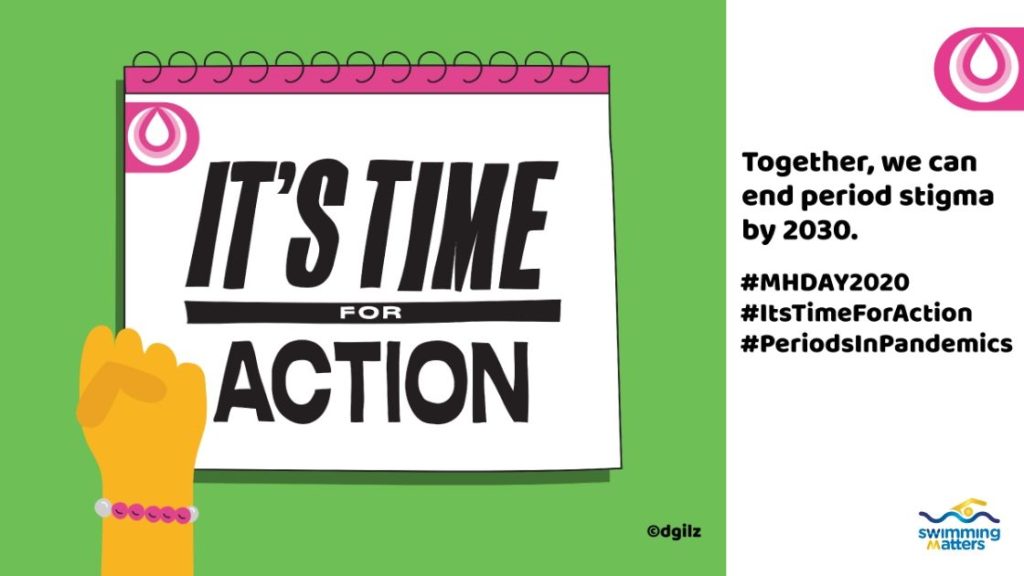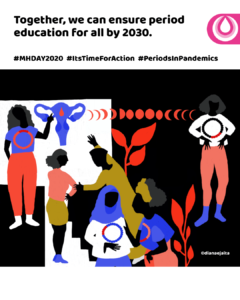
Every year on May 28, to mark World Menstrual Hygiene Day, Swimming Matters supports the global campaign to promote awareness and support for menstrual hygiene. We celebrate as more and more women make peace with their bodies and bring out something that is considered ‘shameful’ out in the open. But even as we acknowledge something that is so normal and natural in women, we must also realize that it does have a profound role to play in how women grow and succeed as swimmers. Periods trigger not only physical changes but impacts emotional and psychological development as well.
When asked about the challenges faced by women swimmers at a SFI-SAI webinar recently, Olympian Shikha Tandon pointed out the elephant in the room. “Many girls drop out or curb their ambition as competitive swimmers during their puberty. Women swimmers are often on their own to navigate through the changes they are going through. Nobody talks about it, so it adds an additional layer of difficulty to the problem,” she said.
In the past, we have carried stories addressing myths around women swimming during their period, and more. But this year, triggered by Shikha’s comments that highlighted the urgency of normalizing the discussions around periods, we want to reach out to male teachers and coaches, to help them talk and think about Periods.
We understand it is easier said than done. Even with women, as parents, teachers and coaches, it is hard enough to have a conversation with 10 year and 11 year old girls, about puberty and menstruation. Therefore, we have created a checklist to help you navigate through female territory, albeit for the right reason – to help our women swimmers achieve their potential without constraints.
How to have open conversations about periods
Get your facts right
Do not depend on guesswork; educate yourself on how the menstrual cycle works and what effect does it have on a woman (We have outlined the basics at the end of the article). Clarify the myths and assumptions around menstruation by researching online. Understand how your swimmer is affected, and to what degree across varying phases of her cycle. With this information, you can tailor the training schedule for her benefit. Use appropriate terminology. Seek medical advice on what kind and type of exercises and training should be done during periods. With your knowledge, you can educate your swimmers about the dangers of over training, taking of birth control pills or hormone pills, and be alert to health warnings like amenorrhea, bone density loss or hormonal fluctuations.
Practice, Practice, Practice
Shy or embarrassed to bring up the topic with your student? Practice in your trusted circles first, starting with your family and friends. Be interested, without making a fuss about it. As you talk more and more about it with them, you will gain the confidence, comfort and context to start such discussions with your swimmers as well.
Get swim parents involved
If need be, get the swimmer’s parents involved while bringing up the discussion on periods. It helps to know how much they know or have discussed with their daughters, to gauge how the swimmer will feel about the subject. You can also enroll a senior woman swimmer when you begin discussions on the subject of their physical development and maturity.
Build trust
Establishing a good, trusting relationship will make a swimmer comfortable to share her issues. She should be able to tell you how she is handling her level of training during her period. With this feedback, you can help her manage her emotions, handle her diet and prevent injuries.
Avoid being dismissive
Bullying, trivializing or dismissive behavior can make the environment for women swimmers uncomfortable. Do not assume that menstrual period is an ‘excuse’ for poor training or performance. It is a fact that everyone is different and everyone changes at different times and rates. Many women do have problems during periods that can come in the way of their performance in the pool. Be supportive, empathetic and compassionate to maintain their trust and confidence.
Adopt technology
Yes, you heard it right! If you are coaching a woman swimmer, you now have period-tracking apps like Glow, Flo, Eve and others that will let you intervene proactively to help her prepare and deal with her periods. Encourage her to maintain a log so that she can be supported at different phases of her menstrual cycle, with her training plan, diet and recovery.
In conclusion, truth be told, this subject goes beyond swim teaching or coaching women swimmers – it impacts the everyday engagement we have with girls and women around us. We are witnessing a cultural shift, where women are accepting their bodies and expecting respect for it. It is time to step up and break long-held myths and stereotypes around periods and puberty, and enable a sensitive, inclusive environment for women to achieve their potential without being tied down to something that is only natural biology at work.
MUST KNOW: BASICS OF MENSTRUATION
How does the menstrual cycle work and what effect can it have on a woman

A menstrual cycle – which lasts, on average, 28 days – can be divided into four phases. Phase one is menstruation, when a woman is having her period, and usually lasts three to five days. The second phase is the time before ovulation. Phase three is between ovulation – usually about day 14 – and the onset of premenstrual symptoms, and the fourth is the premenstrual phase.
A woman is impacted in different ways during each phase due to fluctuations in hormone levels. Beyond the bleeding associated with periods, women often experience pain, tiredness, mood changes, food cravings and abdominal swelling at various times.

Very well written
Good guidelines